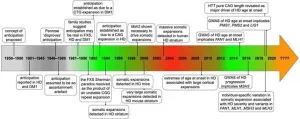Affordable CRISPR app reveals unintended mutations at site of CRISPR gene repair
Study in The CRISPR Journal reports the app advances CRISPR gene therapy R&D; 18-year-old software savant helped lead the app's development
2021-02-11
(Press-News.org) Wilmington, DE, Feb. 11, 2020 -Scientists have developed an affordable, downloadable app that scans for potential unintended mistakes when CRISPR is used to repair mutations that cause disease. The app reveals potentially risky DNA alterations that could impede efforts to safely use CRISPR to correct mutations in conditions like sickle cell disease and cystic fibrosis. The development of the new tool, called DECODR (which stands for Deconvolution of Complex DNA Repair), was reported today in The CRISPR Journal by researchers from ChristianaCare's Gene Editing Institute.
"Our research has shown that when CRISPR is used to repair a gene, it also can introduce a variety of subtle changes to DNA near the site of the repair," said Eric Kmiec, Ph.D., director of ChristianaCare's Gene Editing Institute and the principal author of the study. "We developed DECODR to accelerate the development of CRISPR gene therapies by providing a way to rapidly detect these changes so we can determine whether they pose a risk to patients."
He said that such changes may be harmless, but researchers must determine whether the changes can disrupt the repair itself or alter gene function in a way that could potentially harm patients. He said an easy-to-use tool like DECODR also will be valuable for assessing whether CRISPR gene repairs produce different outcomes from patient to patient that affect safety and efficacy.
"Like many medical interventions, CRISPR gene therapies are likely to come with a mix of risks and benefits," he said. "More information is needed to ensure patients can make an informed decision."
Intern's inspiration leads to potentially industry-changing new tool
The development of DECODR began in 2019 when a young intern at the Gene Editing Institute with a talent for software development offered to help researchers develop an app for analyzing the huge volumes of DNA data produced by a single CRISPR edit. Rohan Kanchana said he was intrigued by the fact that the best way to screen large populations of cells, a process known as "targeted deep sequencing," was too costly and time consuming to be practical for most labs. Meanwhile, his mentorsnoted that available alternatives to deep sequencing did not detect the full range of DNA mutations that may be introduced by a CRISPR gene repair.
The study in The CRISPR Journal presents evidence that the DECODR app, which was written with open-source software to allow for easy updating, can essentially produce the same data as a deep sequencing process in much less time and at a fraction of the cost. The study reports that DECODR can accurately determine a wide range of insertions and deletions of DNA code that may occur during a CRISPR-directed gene repair to better determine how a CRISPR experiment impacts a targeted gene of interest.
"We were particularly interested in developing an algorithm that is capable of crunching a large amount of data to break down or 'deconvolute' the outcome of repairs that involve deleting and inserting long strands of DNA code," said lead author Kevin Bloh, a researcher at the Gene Editing Institute and a Ph.D. candidate in medical and molecular sciences at the University of Delaware. "These are edits where there is a greater risk that unintended mutations introduced by CRISPR could disrupt the targeted gene."
"The beauty of DECODR is that it is designed to be scaled to evaluate insertion and deletions of DNA executed by a CRISPR edit regardless of size," added Byung-Chun Yoo, Ph.D., study author and associate director of the Gene Editing Institute. "This means it can evolve as researchers develop the capacity to attempt more complex repairs."
The challenge of unintended consequences in CRISPR
CRISPR stands for "clustered regularly interspaced short palindromic repeats." It is a defense mechanism found in bacteria that can recognize and slice up the DNA of invading viruses. Scientists have learned how to modify this mechanism so it can be directed to "edit" specific sequences of DNA code, with a focus on repairing DNA mutations that cause deadly diseases.
Dr. Kmiec said DECODR is focused on CRISPR edits that delete a strand of DNA code that is causing a gene to malfunction and insert a new strand of code that corrects the problem--as opposed to edits that are focused on just eliminating or "knocking out" a gene. He noted that even though the repair may target a single gene--such as the malfunctioning gene that causes sickle cell patients to produce abnormal red blood cells--that gene is present in a large number of cells. And he said there is evidence that the process of deleting and inserting DNA code has the potential to introduce subtle mutations near the site of the gene repair, mutations that may vary from cell to cell.
Last year, in a study in the Nature journal Communications Biology, scientists at the Gene Editing Institute found that such unintended changes are more common than previously understood.
According to the new study, "it is the unpredictability and diversity of edited outcomes within a population of cells that have raised caution as CRISPR-directed gene editing programs advance toward clinical application."
Kmiec pointed out that both studies are focused on changes introduced by CRISPR around the site of the intended repair, not on the separate concern about the risk of CRISPR causing "off-target" mutations by drifting far afield from the target and making random cuts across the genome.
For now, Kmiec said DECODR is currently intended solely as a research tool, not in the clinical evaluation of individual patients. It is available online at decodr.org/analyze as a free version that researchers can immediately use to evaluate the outcomes of their CRISPR gene editing experiments. The Gene Editing Institute also is in discussion with partners about licensing a commercial version of DECODR that could provide researchers with a wider range of options.
INFORMATION:
About ChristianaCare
Headquartered in Wilmington, Delaware, ChristianaCare is one of the country's most dynamic health care organizations, centered on improving health outcomes, making high-quality care more accessible and lowering health care costs. ChristianaCare includes an extensive network of primary care and outpatient services, home health care, urgent care centers, three hospitals (1,299 beds), a free-standing emergency department, a Level I trauma center and a Level III neonatal intensive care unit, a comprehensive stroke center and regional centers of excellence in heart and vascular care, cancer care and women's health. It also includes the pioneering Gene Editing Institute and was rated by IDG Computerworld as one of the nation's Best Places to Work in IT. ChristianaCare is a nonprofit teaching health system with more than 260 residents and fellows. With the unique CareVio data-powered care coordination service and a focus on population health and value-based care, ChristianaCare is shaping the future of health care. Learn how ChristianaCare delivers greater quality and value at https://christianacare.org.
About ChristianaCare's Gene Editing Institute
The Gene Editing Institute, a worldwide leader in CRISPR gene editing technology and the only institute of its kind based within a community health care system, takes a patient-first approach in all its research to improve the lives of people with life-threatening disease. Since 2015, researchers at the Gene Editing Institute have been involved in several ground-breaking firsts in the field, including the development of the first CRISPR gene editing tool to allow DNA repairs outside the human cell which will rapidly speed therapies to patients and a unique version of CRISPR called EXACT that reduces the number of off-target edits to other areas of the genome, which is vital for further research and patient applications. Its researchers are currently developing a patient trial for lung cancer using CRISPR and employing the technology to combat the COVID-19 pandemic. END
ELSE PRESS RELEASES FROM THIS DATE:
2021-02-11
Amsterdam, February 11, 2021 - Recent genetic data from patients with Huntington's disease (HD) show that DNA repair is an important factor that determines how early or late the disease occurs in individuals who carry the expanded CAG repeat in the HTT gene that causes HD. The processes of DNA repair further expand the CAG repeats in HTT in the brain implicated in pathogenesis and disease progression. This special issue of the Journal of Huntington's Disease (JHD) is a compendium of new reviews on topics ranging from the discovery of somatic CAG repeat expansion in HD, to our current understanding of the molecular mechanisms involved ...
2021-02-11
In the last 25 years, scientists have discovered over 4000 planets beyond the borders of our solar system. From relatively small rock and water worlds to blisteringly hot gas giants, the planets display a remarkable variety. This variety is not unexpected. The sophisticated computer models, with which scientists study the formation of planets, also spawn very different planets. What the models have more difficulty to explain is the observed mass distribution of the planets discovered around other stars. The majority have fallen into the intermediate mass category - planets with masses of several Earth masses to around that of Neptune. Even in ...
2021-02-11
LAWRENCE -- Nearly every fall, as football teams return to the field, tragic stories of players falling ill and even dying of heat trauma make the headlines. What many don't consider is that marching band members -- who don heavy uniforms and perform in the same sweltering temperatures -- may also be at risk.
A study led by the University of Kansas has measured core temperatures, hydration and sweat levels of marching band members and found that they are very much at risk and deserve access to athletic trainers for their safety -- just as players do.
The study used high tech methods to gauge band members' body core ...
2021-02-11
A study led by researchers at Baylor College of Medicine reveals a novel role of the steroid receptor coactivator 3 (SRC-3/NCOA3), a protein crucial for steroid hormone function and a prognostic marker for aggressive human breast and other cancers.
The team discovered that SRC-3 also regulates human immune T regulatory cells (Tregs), which contribute to the regulation of the body's immunological activity by suppressing the function of other immune cells, including those involved in fighting cancer. The study, which appears in the journal Scientific Reports, shows that Tregs whose SRC-3 function was eliminated failed to suppress the activity of other immune cells in the lab. The authors anticipate that their findings ...
2021-02-11
The golden-mantled ground squirrel (Callospermophilus lateralis) is a popular sight among tourists in the Rocky Mountains--the small rodent is a photogenic creature with a striped back and pudgy cheeks that store seeds and other food.
But there's a reality that Instagram photos don't capture, said Christy McCain, an ecologist at the University of Colorado Boulder. In a new study spanning nearly 13 years, she and her colleagues discovered that the ground squirrel has joined many other small mammals in Colorado's Rocky Mountains that are making an ominous trek: They're climbing uphill to avoid warming temperatures in the state brought on by climate change.
"It's frightening," ...
2021-02-11
Globular clusters are extremely dense stellar systems, in which stars are packed closely together. They are also typically very old -- the globular cluster that is the focus of this study, NGC 6397, is almost as old as the Universe itself. It resides 7800 light-years away, making it one of the closest globular clusters to Earth. Because of its very dense nucleus, it is known as a core-collapsed cluster.
When Eduardo Vitral and Gary A. Mamon of the Institut d'Astrophysique de Paris set out to study the core of NGC 6397, they expected to find evidence for an "intermediate-mass" black hole (IMBH). These are smaller than the supermassive black holes that lie at the cores of large galaxies, but larger than stellar-mass black holes ...
2021-02-11
Rheumatic heart disease (RHD) develops as a long term complication of childhood streptococcal angina. Latent RHD can be detected with echocardiography years before it becomes symptomatic. RHD is curable when treated early with medication.
RHD is responsible for over 300 000 deaths worldwide each year, accounting for just over two-thirds of all deaths from valvular heart diseases. RHD is disproportionally prevalent across sub-Saharan Africa, South Asia and the Pacific Islands and largely a phenomenon of marginalized communities in developing and emerging countries whereas ...
2021-02-11
Millions of tonnes of plastic waste find their way into the ocean every year. A team of researchers from the Institute for Advanced Sustainability Studies (IASS) in Potsdam has investigated the role of regional ocean governance in the fight against marine plastic pollution, highlighting why regional marine governance should be further strengthened as negotiations for a new global agreement continue.
In recent years, images of whales and sea turtles starving to death after ingesting plastic waste or becoming entangled in so-called ghost nets have led to a growing ...
2021-02-11
Domestic cats are a major threat to wild species, including birds and small mammals. But researchers reporting in the journal Current Biology on February 11 now have evidence that some simple strategies can help to reduce cats' environmental impact without restricting their freedom. Their studies show that domestic cats hunt less when owners feed them a diet including plenty of meat proteins. Equally, it helps to play with them each day in ways that allow cats to mimic hunting.
"While keeping cats indoors is the only sure-fire way to prevent hunting, some owners ...
2021-02-11
Domestic cats hunt wildlife less if owners play with them daily and feed them a meat-rich food, new research shows.
Hunting by cats is a conservation and welfare concern, but methods to reduce this are controversial and often rely on restricting cat behaviour in ways many owners find unacceptable.
The new study - by the University of Exeter - found that introducing a premium commercial food where proteins came from meat reduced the number of prey animals cats brought home by 36%, and also that five to ten minutes of daily play with an owner resulted ...
LAST 30 PRESS RELEASES:
[Press-News.org] Affordable CRISPR app reveals unintended mutations at site of CRISPR gene repair
Study in The CRISPR Journal reports the app advances CRISPR gene therapy R&D; 18-year-old software savant helped lead the app's development






